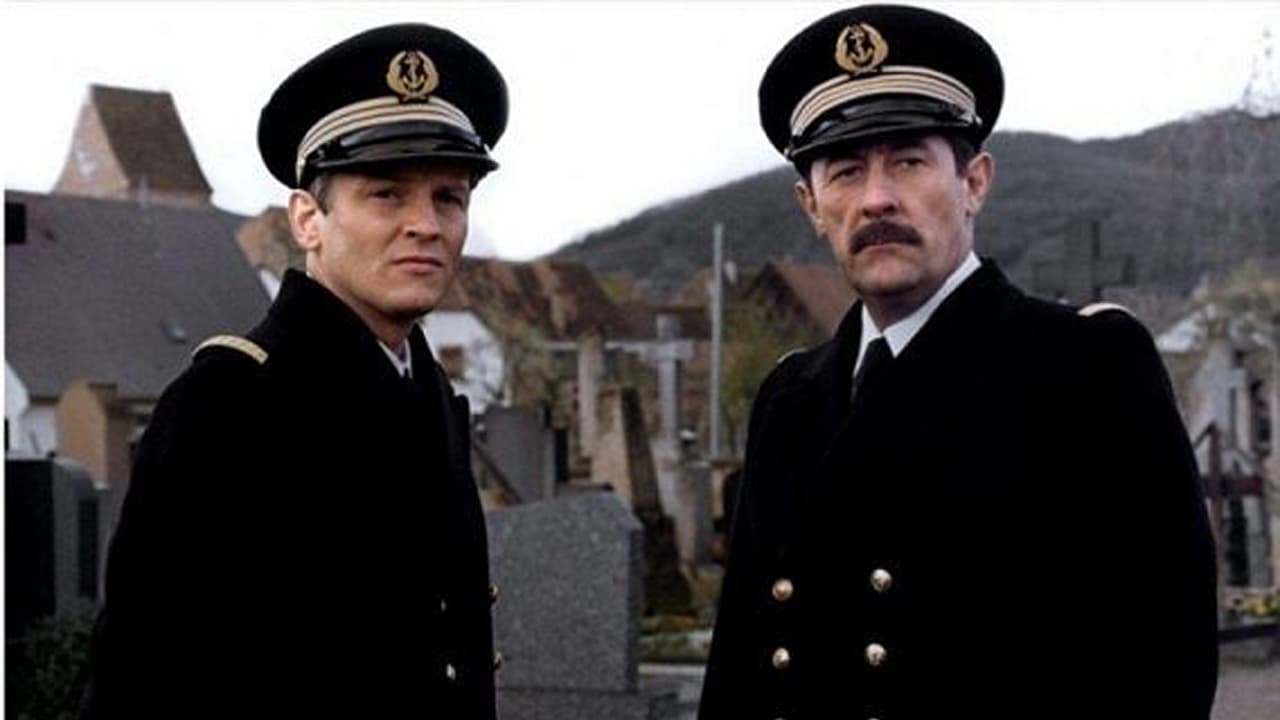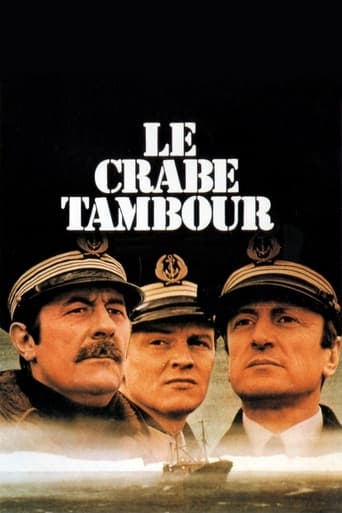

From my favorite movies..
... View MoreAbsolutely brilliant
... View MoreIt's hard to see any effort in the film. There's no comedy to speak of, no real drama and, worst of all.
... View MoreThe movie really just wants to entertain people.
... View MoreA chance remark leads three French naval officers to reminisce, together and privately, about the compelling young commander Willsdorf, nicknamed The Drummer Crab, recalling his exploits from the fog-shrouded rivers of Indochina to an attempted military coup in Algeria to his lonely, anonymous vigil in the North Atlantic fishing lanes nearby. Joseph Conrad would have loved this film, arguably the finest modern seafaring adventure ever made: a thoughtful and thrilling study of man versus the elements, where the past itself becomes an elemental force even more unyielding than the vivid Winter seascapes captured by Raoul Coutard's breathtaking cinematography. In metaphor, Willsdorf's fate is the fate of French colonialism, and only by pursuing his memory, through crashing waves and hissing spindrift, can his three erstwhile companions (a dying captain, a middle-aged medical officer, and a robust, veteran Chief Engineer) confront and endure their collective loss. This is a spellbinding film, rich in history and detail.
... View MoreLe Crabe Tambour is like no other movie about soldiers that you will see, being a movie that in some parts resembles Citizen Kane, in other parts Rashomon. The doctor on a ship's final voyage across the Atlantic serves as the connecting link for the episodes that describe the title character, Wilsdorf, nicknamed "Drummer Crab." At one point, the ship's captain says Wilsdorf's two best friends were his black cat and the doctor. From what happens, Wilsdorf had another best friend, the captain, but that friendship ends as a result of events described in the movie.Wilsdorf's adventures start off as picaresque, but they become grimmer as he takes a role in a military conspiracy, details of which are only vaguely described. You have as characters in this movie older soldiers –the captain, the doctor and the chief, and Wilsdorf, who is not shown as aging. A nurse at the harbor the ship stops at comments that usually ship's doctors are young. But Le Crabe Tambour is about old soldiers fading away, all except Wilsdorf, who is only shown through the memories of others.Pierre Schoendoerffer also directed La 317e section in 1967, which has the character Lt. Wilsdorf in it, then in a supporting role as a soldier at Dien Bien Phu. Wilsdorf was an Alsatian drafted by the Nazis who then became a French soldier and finally, a fisherman, with a boat off the fishing grounds by Labrador. Being a literary sort, Schoendoerffer does not explain everything at the end like a typical mystery story. Behind the opening and closing credits are images of ships beached on shore, wrecks that have outlived their usefulness, just like the ship's captain. The real French frigate, the Jaureguiberry, filmed for this movie on its last voyage, gets a mention in the last credit. When you see the ship's bow plowing through high waves in the North Atlantic, you also see the sides of the ship, with rust patches on it. The ship, like some of its passengers, has reached the end of the line. Le Crabe Tambour is not about just the adventures of an errant soldier, but is an attempt to put on screen the meaning of life for career military men at the end of their careers, with one, the ship's doctor, having a last chance to find out the truth about Wilsdorf.I doubt that the French movie industry will finance another movie like Le Crabe Tambour, which is an example of "art for art's sake." I saw the movie on the Image laser disc of the movie, an Interama Video Classic. The LD version had hardcoded English subtitles. The movie was released overseas in 1977, but in 1977 there was almost no distribution anymore of subtitled foreign movies in the United States. Le Crabe Tambour only made it to New York City in 1984 for a short run. There is a DVD version of the movie now on sale in France, but like most French movie DVDs, that DVD has no English subtitles. So, Le Crabe Tambour falls by the wayside, even though its subject, soldiers' fates, is as timely as ever.
... View MoreThis was an amazing movie to look at--the footage of the North Atlantic was gorgeous and breathtaking. I can really appreciate all the trouble everyone went to making this film. However, apart from the great cinematography, I found the movie not particularly interesting. I think that is because the film is told in the form of flashbacks from several different people--it tends to bounce around a bit and can lose the viewer in the process. Getting lost was not as big an issue for me, as I am a history teacher. However, many non-French viewers will not understand the context for what occurs in the movie and the flashbacks will leave them baffled.FYI to anyone wanting more background info--Following WWII, the French were trying desperately to hold on to the colonies it controlled before the war. The movie begins with the French in Indochina (Vietnam). They are continuing a war that had actually begun before the Japanese took over Vietnam. In essence, when the Japanese left, the war between the French and Nationalists resumed. The French lost this war in the mid-1950s and the United States entered this fray about a decade later.Although there were some other small skirmishes along the way that were not mentioned in the film (such as the joint British-Israeli-French invasion of the Suez region), the movie picks up AFTER an abortive coup in the early 1960s. That's because Nationalists in Tunisia and Algeria had been pressing the French for independence (though many saw this land as an extension of France--not merely colonies--and losing it was unthinkable to them). This seriously undermined the French government and the military made attempts on deGaulle's life as well as attempts at a military coup. The officers involved were in some cases executed, imprisoned or fled the country. All this occurred because deGaulle's government reluctantly agreed to give up North Africa and the military felt this was a betrayal of France. The lead in the movie Drummer Crab was apparently one of those involved in these coup attempts. Another film that briefly discusses this same topic is the incredibly great film, Day of the Jackal (not to be confused with the supposed remake).
... View MoreCRABE-TAMBOUR's base-camp story is simple-- the antiquated officers of a functionless army spend a voyage home on rough North Atlantic seas recounting stories of a cavalier-soldier whose busted military career spanned France's last years of colonial globalism. This beautiful film (master Raoul Coutard's sea-footage is a film unto itself) is rich, ironically resonant, and in a wrenching last scene, comparable to Peckinpah in its regard for its stoic heroes, the last-men-standing at the sorry end of empire.
... View More